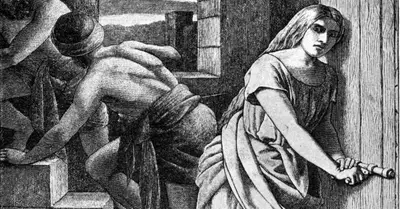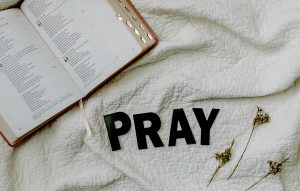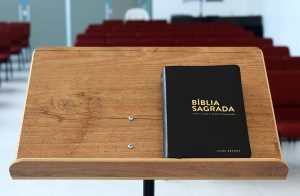Her name was Rahab.
“Altogether elsewhere, vast herds of reindeer move across miles and miles of golden moss, silently and very fast.“
Rahab in the Book of Joshua
The Book of Joshua marks the moment and describes the first movements of the Conquest: “And Joshua the son of Nun sent two men secretly from Shittim as spies, saying, ‘Go, view the land, especially Jericho.’ And they went and came into the house of a prostitute whose name was Rahab and lodged there” (Joshua 2:1).
However debaucherous, brothers, bars, and “red light” districts have often functioned as infamous meetings placed for military espionage. Thus, we must not be surprised that Joshua’s advance team knew to go to “Rahab’s Place.” Some branches of Jewish tradition emphasize Rahab as merely an innkeeper. But the Hebrew word, zōnâ, is interpreted in the Septuagint as pórnē. Thus, we read of Rahab’s identity in the New Testament:
“By faith Rahab the prostitute did not perish with those who were disobedient, because she had given a friendly welcome to the spies” (Hebrews 11:31 ESV).
Rahab was an innkeeper who, sadly, found other ways of bringing in revenue. Of course, the Canaanites were infamous for cultic prostitution related to idolatrous worship. It may very well have been that Rahab was “a religious prostitute” in pagan practices. We only know what the Bible reveals.
The Story of Rahab
But there’s more to the story of Rahab — so much more. Rahab recognized the God of Israel. She trusted in him for the righteousness she could not produce in her own life:
“I know that the Lord has given you the land, and that the fear of you has fallen upon us, and that all the inhabitants of the land melt away before you. For we have heard how the Lord dried up the water of the Red Sea before you when you came out of Egypt, and what you did to the two kings of the Amorites who were beyond the Jordan, to Sihon and Og, whom you devoted to destruction. And as soon as we heard it, our hearts melted, and there was no spirit left in any man because of you, for the Lord your God, he is God in the heavens above and on the earth beneath” (Joshua 2:9-11 ESV).
Whatever Rahab was before Israel crossed into the land of the Canaanites she became someone new in the promised land. For Rahab believed. She not only believed in God but she also acted. For Rahab trusted in God who fulfilled the covenantal promise to Abraham that he would be given land from which would bring a nation, and a descendant, who would bless the earth. And we must always remember that this woman, rehab, was chosen by Almighty God to be a chosen instrument in bringing about salvation to the ends of the earth.
“And in the same way was not also Rahab the prostitute justified by works when she received the messengers and sent them out by another way” (James 2:25)?
The Importance of Rahab
Rehab became a central strategic figure of incomparable courage as she helped Israel to enter the promised land and subdue her own people. Whenever the Army of Israel entered Canaan, Rahab acted according to a prearranged plan and hung out a scarlet cord from the window of her establishment. Thus, she and her family were saved. How interesting that a scarlet cord, likely, an emblem of ill-repute, became a sign of salvation. How very beautiful to think that it is a scarlet cord of the covenant of God’s grace that binds all of the Word of God together. And in Christ Jesus, the blood-stained crimson cross of shame became the gleaming symbol of salvation.
Rahab’s faith in God engrafted her into a new family. Even more, Rahab was, soon, engrafted into the physical family of Israel as she became the wife of Salmon, one of the leaders of Israel who supported Moses when they left Egypt. Rahab’s husband is chronicled in both the Old and New Testaments (1 Chronicles 2:10-11, Ruth 4:20-21, Matthew 1:4-5 and Luke 3:32).
A Woman Saved by Faith
The woman who had been called a harlot became a godly wife and mother in Israel. She and her husband became the parents of a boy named Boaz. And that boy would one day marry a widow woman by the name of Ruth (Ruth 4:5, 10). Thus, as God worked all things together for the good, using the humble and the most unlikely, God raised up a harlot to become the great-great-grandmother of King David. From the line of Rahab came the Messiah of Israel, the Savior of the world, our God and King, the Lord Jesus Christ. There is no more touching story of God’s glorious grace than the genealogical introduction to the birth of Jesus by faith through the line of Joseph in Matthew chapter 1. Among the many stories that are interwoven in that wonderful section of the Bible, the woman of the scarlet cord takes her honored place.
And so if you ask me, “How could God possibly use me? How could Almighty God, the holy God of heaven, use such a sinner like me?” Then I will introduce you to the woman of the scarlet cord, the greater grandmother of our Lord and Savior Jesus Christ. She is not remembered for her sin. She is remembered for the remarkable transformation. The word “harlot” is undoubtedly repeated so that you and I will know that whatever we have done God will forgive us if we come to him by faith. Rahab is the ever-present message of God to you:
“Therefore, if anyone is in Christ, he is a new creation. The old has passed away; behold, the new has come” (2 Corinthians 5:17).
Learn more about the Story of Rahab from Christianity.com





















